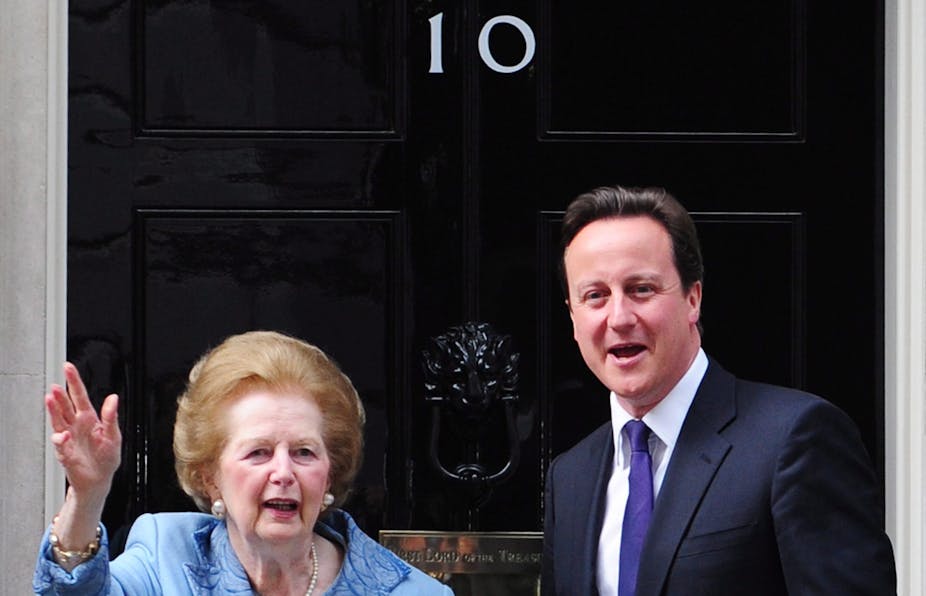Margaret Thatcher, Baroness of Kesteven, has died of a stroke aged 87.
The first female prime minister of the United Kingdom, Thatcher held office between 1979 and 1990 before being removed in an internal leadership coup by her own Conservative party.
Thatcher was a divisive figure who will be remembered as one of the modern political greats. She comfortably won general elections in 1979, 1983 and 1987 and is credited with being so effective that the Labour party under Tony Blair turned to the right because she had altered the landscape of British politics.
A committed right wing free marketeer, “Thatcherism” influenced political thinking outside the UK, with many Australian politicians such as Tony Abbott being on the record as admiring Thatcher’s ideas and acts in her period of office. She also enjoyed widespread support in the US and shared a warm relationship with President Ronald Reagan.
Key events in Thatcher’s period in office included the divisive strike by the National Union of Mineworkers in 1984-85, widely seen as the breaking of union power in Britain, and the Falklands War.

Thatcher also survived a series of assassination attempts by the Provisional Irish Republican Army, most notably in the bombing of the Grand Hotel in Brighton during the Conservative party conference in 1984.
But it was her effect on wider British political and social life that will generate the most comment in coming days.
The Conversation spoke with experts on UK politics about how Thatcher will be remembered and the effect she had on British life.
Ivor Gaber, Professor of Political Journalism at City University, London, said that Thatcher’s period in office has defined British politics ever since:
“She was clearly one of the major political figures of the 20th century. She was somebody whose impact on British politics and British society has been long lasting and she handed down a legacy that virtually every government since has continued.
"She was a very adept politician, controversial, loved and hated in equal measure and her death is a major moment in contemporary British history.
"She was also one of the most divisive figures in modern British political history. She was responsible for breaking the political consensus that had been central to British politics in the post-war era. British politics has not been the better as a result.”
Gaber continued:
“But more people will mourn her than celebrate. It is past, she was an old lady. People who supported her will mourn because she is somebody she respected. I won’t say loved because I don’t think apart from [husband] Denis, anybody much loved her. I think this will be a profound moment because at the moment, in terms of British political discourse, the legacy of Thatcher lives on.”
Timothy Lynch, Associate Professor of Politics at Melbourne University, said:
“Margaret Thatcher’s ‘place in history’ was assured as much by the force of her character as by the ‘-ism’ that bears her name. But it is Thatcherism which offers the model for those nations keen to throw-off state-control.
"Can that ideology exist without the unique moral leadership Thatcher offered Great Britain? This is perhaps the greatest test of her legacy. Thatcherism is not about quick profits; it decries the arrogance of wealth; it facilitates prosperity but bids that it be responsibly channelled by the individual lest it be expropriated by the state.
"Margaret Thatcher herself would never assert that Thatcherism, however defined, holds the key to human happiness. Only the failed dogmas of the left dared to claim so much. But for a people animated by the morality of the market – its need for discipline and self-sacrifice – Thatcherism offers a sure guide. Her experiment on a little island may yet still engulf the world.”
John Keane, Professor of Politics at Sydney University, was more direct in his assessment of Thatcher’s effect on Britain.
“When historians look back on her thumping flag-waving reign, they’ll be inclined to see that she put Britain on a road to ruin. A Britain where life for many millions of people came to resemble Hobbes’ state of nature: more solitary, poorer, nastier, brutish and short,” he said.

Dr. Duncan McDonnell, Marie Curie Fellow in the Department of Political and Social Sciences at the European University Institute in Florence, said:
“Her legacy depends a lot on your own politics. You can already see on Twitter that she is still a figure who divides people and provokes strong reactions, both positive and negative. On the positive side, whatever your politics, it’s impossible to ignore the significance of her becoming the first woman prime minister in a major Western democracy and then being the longest continuous-serving PM in 20th century British history.
"Again, whatever your politics, it’s impossible to dispute that - along with Ronald Reagan - she did a huge amount to change the way our democracies think about the relationship between the state and the market. Her good relationship with Mikhail Gorbachev also surely helped to bring about the conditions by which the Cold War ended.
"On the negative side, there are also many things one could mention: the strong-arm tactics used in the miners’ strike, the lack of strong support for change in South Africa, the warm relationship with a dictator like General Pinochet, and the inflexible attitude to the conflict in Northern Ireland in which she clearly sided heavily with the Unionists.”

